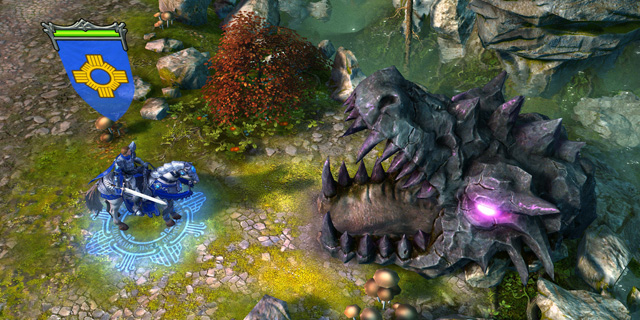
Come with us to a mystical land. A land where heroes roam, dragons fly and the undead shoot you with bone arrows. A land of heroes and villains, though the villains are also heroes. A land of blood and tears, each marked by very specifically-calculated meters. Yes, this is Might & Magic, a peculiarly-balanced realm of lush fantasy and very structured battle mechanics.
The Heroes of Might & Magic series holds a distinctive place in the PC gaming zeitgeist. It flourished early, as the spinoff of the core Might & Magic series quickly took the spotlight from its progenitor. A rushed fourth installment marked the end of developer New World Computing (as well as publisher 3DO), and a fifth entry, with a focus on a 3D world and much-modified game mechanics, met with a mixed reception. Lately, we’ve seen two spinoff games (the stellar puzzle-RPG Clash of Heroes and the browser-based Heroes Kingdoms), while various other titles (like Disciples III and the King’s Bounty revival) have tried to mimic the Heroes formula.
Might & Magic: Heroes VI (with a nomenclature change we’re begrudgingly accepting) is an attempt to bring back the best of the much-celebrated Heroes III, while working off the world and engine of V. You’re still controlling a handful of heroes, moving them around the map, capturing buildings, upgrading cities and amassing large armies. You can zoom in if you’d like, but new developer Black Hole Entertainment knows how the game plays best: from a zoomed-out, top-down perspective that shows the necessary information and omits the rest. Besides that, the game just feels like it used to.
The five factions have been shuffled and re-balanced, which could ruffle feathers at first. The forestfolk Sylvan faction is nowhere to be found, so there are no elves here. There aren’t magi, gargoyles, peasants or lizardmen, either. (Though we detect hints of expansion content.) A completely new faction, Sanctuary, is something we haven’t seen in a game before: a water-based crew with Asian themes. (Did you want shark guards? You have those now.) Each of the five has been balanced with largely-equal ranged and healing abilities, which veteran players know are the keys to being competitive.
The single-player experience contains five main campaigns, plus a short tutorial one and an epilogue to wrap things up. Each campaign follows a child of Duke Slava, who is a guy we’d tell you about if the writing weren’t painful enough to experience even with gameplay surrounding it. It’s just as campy as previous installments. Now, there’s just more voice acting. Still, the objectives for the campaign are varied and interesting, and that’s what matters.
Here’s where the new game’s extra layer of complexity comes in. There’s a new “Tears and Blood” system, that largely works like Mass Effect’s Paragon-Renegade system. Show mercy? You get Tears points. Chase down fleeing enemies? Yep, that’s Blood. Characters’ abilities and spells can also have an alignment. Reaching certain thresholds gives you access to a special ability, and though you can fill up both meters, you can only progress down one path. While managing that meter, the campaign includes quests, with little things to accomplish and little rewards for doing it. (Because the game needed a little more Skinner in it.) A few of them only work online, which seems a bit unnecessary.
Progression isn’t limited to one campaign anymore, either. There’s a Dynasty system, letting you earn global experience, complete achievements and gather credits to spend on various in-game unlocks. You can also make a persistent set of characters to use, and give them small game-start bonuses (that you also pick up from the shop). These elements can start to get distracting, but luckily you can choose to turn off a lot of this in multiplayer skirmishes.
Despite this extra layer of crazy on a game with enough to manage, Heroes VI is the best we’ve seen from the series in a decade and worth checking out. At least, eventually. Even with multiple delays, the game’s quite prone to glitches, freezes and hiccups. Hopefully a few patches will iron out the wrinkles, but as it is, we’re thankful for the game’s multiple-turn autosaves. We’d much rather have a game have stability issues than design issues, and the underlying structure is what Heroes fans have been wanting.
Pros: Well-balanced factions, return to what made Heroes III great
Cons: Obtrusive online system, stability issues



















